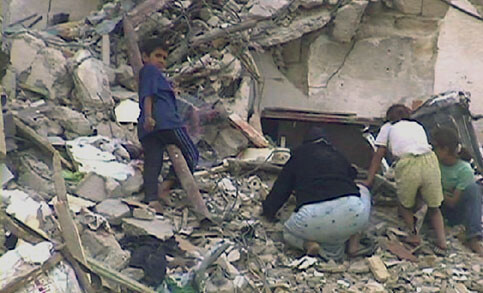Palestinian Center for Human Rights 17 January 2004

An Israeli raid on Rafah on 10 October resulted in the killing of 8 Palestinians and complete or partial destruction of 168, leaving at least 2,000 Palestinian refugees homeless (Photo: PCHR, 2003)
Israeli occupying forces conducted 3 incursions into various areas in the southern Gaza Strip town of Rafah, in an ongoing Israeli military operation against Palestinian civilians and property, which began at noon on Friday, 16 January 2004. Under cover of indiscriminate shelling, Israeli forces destroyed a mosque and 9 Palestinian houses and razed 9 donums[1] of agricultural land. As a result, approximately 75 Palestinians, mostly children and women were made homeless, adding to the thousands who have been left homeless by similar Israeli military operations in the Occupied Palestinian Territories (OPTs).
In similar operations since the beginning of al-Aqsa Intifada in September 2000, Israeli occupying forces have demolished hundreds of Palestinian homes in Rafah. These operations have been continually justified by Israeli authorities on the grounds of ‘security’ necessity.
However, the lack of evidence to support such ‘security’ claims, the excessive destruction inflicted, and the location in which most demolitions take place, indicates that there are other strategic reasons behind these operations. The house-demolition operations in Rafah are part of a strategic Israeli policy to clear a large section of Palestinian land along the border with Egypt, in order to create a wider buffer zone and consolidate Israeli military control in the area. In this context, Israeli occupying forces have continued to construct a concrete and metal wall parallel to the border with Egypt, on land confiscated by Israeli forces following similar house demolition operations. There is also some indication that Israeli forces are constructing a road on Palestinian land behind the wall in order to facilitate easy access from Israel to illegal Israeli settlements in the Gush Katif settlement block.
According to preliminary investigations conducted by PCHR, at approximately 12:00 on Friday, 16 January 2004, Israeli occupying forces under cover of indiscriminate shelling and reinforced by heavy military vehicles, including bulldozers, moved into ‘Oraiba area in the northwest of Rafah. They forced the residents of 3 houses (31 civilians) to leave their homes, severely beating 3 of them. Armored Israeli military bulldozers then demolished the houses and razed 9 donums of Palestinian agricultural land, on which 9 greenhouses stood. It is also worth noting that the only road between the Gush Katif settlement block and Morag settlement, north of Rafah, passes through the ‘Oraiba area.
On Saturday morning, 17 January 2004, Israeli occupying forces moved approximately 200m into Block L of Rafah refugee camp, adjacent to the Egyptian border, indiscriminately shelling in the area. Soon after, armored Israeli military bulldozers demolished a Palestinian house, in which 10 people live, without allowing the residents to remove their belongings. They also demolished al-Tawhid Mosque, which had been damaged during a previous military incursion. At time of writing, Israeli occupying forces remain in the area, firing indiscriminately at Palestinian homes.
At approximately 03:00 on Saturday, Israeli occupying forces moved into Qeshta neighborhood near Salah al-Din Gate on the Egyptian border, south of Rafah. This Israeli military incursion continued until 06:00, during which time armored Israeli military bulldozers completely demolished 2 Palestinian houses and 3 others partially. Prior to this operation, 34 people (7 families) lived in these homes.
PCHR remains deeply concerned about the ongoing violations of international human rights and humanitarian law carried out by Israeli occupying forces against the Palestinian civilian population in the OPTs. PCHR has consistently reiterated its concerns regarding the Israeli policy of demolishing Palestinian civilian property. The extensive destruction of civilian property not justified by military necessity, and carried out wantonly and unlawfully, constitutes a grave breach of the Fourth Geneva Convention of 1949.
PCHR reasserts that the ongoing failure of the international community, specifically the High Contracting Parties to the Fourth Geneva Convention, to intervene to ensure protection for the Palestinian civilian population has served to encourage further Israeli violations of international human rights and humanitarian law in the OPTs. PCHR reiterates its call for the international community, particularly the High Contracting Parties, to take immediate steps to ensure the protection of the Palestinian civilian population and civilian property in the OPT.
Related Links: